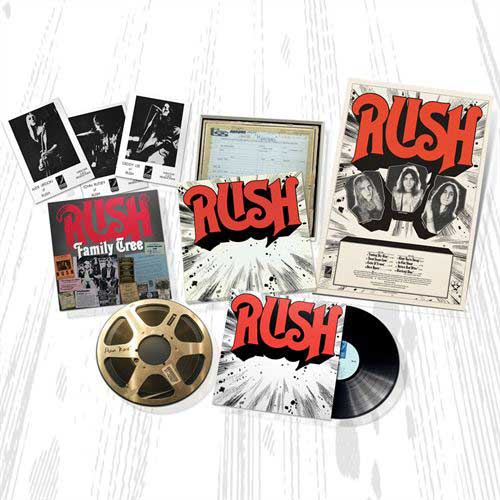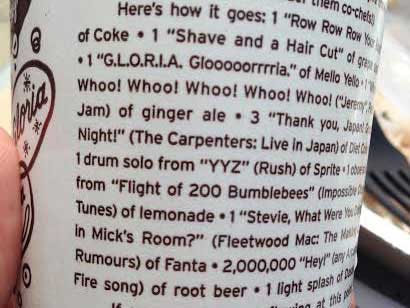Don't forget to donate!
http://www.alsa.org/
"Rush is often referred to as a libertarian rock band, but really what the band is channeling is an Aristotelian individualism, a philosophy that strongly resonates with today's 40-somethings. This helps explain the band's resurgence in popularity, culminating in its 2013 induction in the Rock and Roll Hall of Fame. 'Rush: Life, Liberty and the Pursuit of Excellence' brings together the excitement of the band's progressive music, performed by three musicians whose mastery of their instruments has won them the admiration of their peers, and the surprising philosophical sophistication of their music's lyrics. The book is a systematic look at the Aristotelian philosophy embedded in the band's lyrics over its 40-year recording career.For more info, visit the author's book page here. - Thanks Robert for the headsup!
Although the topic of the book is academic, the writing is sharp, down-to-earth, and leavened with a dry wit. Anyone interested in the band's music, popular culture, and philosophical ideas simply explained will enjoy this entertaining and thought-provoking work.
As a cultural phenomenon, Rush is worthy of serious study, and although other books have looked at the philosophical character of the band's music, this is the first time the music over the band's entire 40-year career is demonstrated to fall under a single, unified theory: Aristotelian individualism.
Even readers who have pored over earlier books on Rush will enjoy this unifying theme. 'Rush, Rock Music and the Middle Class' (by Chris McDonald), says Rush is an avatar of middle class values. While the work ethic and value structure of the middle class is part of the band's philosophy, that is just a subset of the band's Aristotelianism, as shown by Robert Freedman here. The unified Aristotelian philosophy is also different from what's discussed in 'Rush and Philosophy' (edited by Durrell Bowman and Jim Berti) looks at the band's music through multiple philosophical filters and no attempt is made to look at the music through a single, unifying lens. Another book that studies Rush lyrics, 'Mystic Rhythms' (Carol Selby Price ad Robert M. Price), provides an interpretation of selected lyrics but does not systematically look at any philosophy. Rather, it approaches the lyrics as literary analysis and provides no overarching theoretical framework."







Dana: "3 beers and you are already sloppy. You're not getting laid tonight." Aaron: "Poor Geddy Lee." Dana: "Who's Geddy Lee?" Aaron: "The lead singer of Rush...He is also head of the rhythm section of my personal humpty-hump band." Dana: "Hmmm... Poor little Geddy Lee." Aaron: "He's not little. He's of average to maybe above average height." Dana: "I'm sure he'll be able to lay some sweet beats down once the band gets back together." Aaron: "Jesus Christ ... he's the bassist."
Daniel: "Rush? Really?" Sponsor: "Yeah - I like Rush. So what?" Daniel: "Are you Canadian?" Sponsor: "No. I'm just a fan." Daniel: "Do you like them when you're sober? I mean that's impressive. I mean 2112 is an okay album but" Sponsor: "Hemispheres dude?!" Daniel: "Hemispheres is like...ok it's fine...I may be buzzed now but tomorrow I'll be sober and you sir, will still be a Rush fan."
“I know my mom is very happy!” frontman Geddy Lee told the Toronto Star. “We met with the park architects and were really impressed with the thought and plans they have for it,” Lee said.Update, July 16: Geddy Lee, Alex Lifeson: Rush members’ names proposed for art park in Willowdale" - North York Mirror, July 16, 2014
Early designs for the area include art installations, a collaborative performance space and even a small bandshell for “acoustic concerts,” according to Willowdale Councillor John Filion, who first hatched the tribute plan two years ago.
“I was standing around one night with a fellow music lover trying to think of somebody who had grown up in Willowdale who was a famous artist or musician,” Filion said. “We both came up with the name Geddy Lee almost simultaneously.”
The councillor contacted Lee with the idea, and he immediately got on board — albeit with one condition. “He said he was interested and honoured, but also suggested it be named after Alex Lifeson, too,” Filion said.
According to rock lore, Lee and Lifeson met as students at the nearby Fisherville Junior High School, where they first forged the musical bond that would eventually blossom into one of rock’s most prolific power trios. “It is where I met my best friend and bandmate,” Lee said. “We were humbly honoured by the suggestion to name the park after us.”
"...Lee and Lifeson are expected to be honoured when a unique creative space in Willowdale is named the Lee Lifeson Art Park. A report on the proposed name is scheduled to come before North York community council Aug. 12.
"The name has been applauded by residents at two community meetings and Lee and Lifeson are pleased with the honour, Willowdale Councillor John Filion said. “They were wonderful about it. They asked a lot of questions,” he said about meeting with the band mates about the idea in May. “They said they would be honoured to have a park like this named after them.”
"The park will be built next year northeast of Yonge Street and Sheppard Avenue between Hillcrest and Princess avenue, east of Gladys Allison Place. While it will be a local space meant for area residents, it will be more than an ordinary park.
"“Two years ago, I came up with the idea to create a park that would focus on the arts and would be a celebration of creativity, where people could go to be creative or go to enjoy others’ creativity,” Filion said. “All the arts will be represented there but the focus will be on music and sound. This is really a new concept, there isn’t a prototype anywhere. It’s nothing we’re copying from anywhere else.” When it came time to think of a name for the park, Lee and Lifeson’s names “just jumped off the page,” Filion said.
This fall, Canadian rock band Rush is coming to town in the form of a new class to be offered at Tiffin University.
The course, "Rush: Progressive Rock and Modern Society," is to explore the musical and cultural issues of the 1970s and '80s, according to course instructor and adjunct professor Nathan Santos.
“If I had to pick a favorite band of all time, it would be Rush.- Thanks to RushFanForever for the headsup!
"As a teenager, I was already familiar with the group and its albums like Moving Pictures and Signals. But once I discovered 2112, it opened me up to this whole concept that rock music could be bigger than just a tune—that it could be used as a vehicle to tell a story or to transport you to some other world.
"The idea of a big piece like that being broken down into numbered sections like they were chapters in a book was just unbelievable to me, and it’s a technique that I continue to use to this day.
“I have so much respect for [Rush drummer] Neil Peart, especially as a lyricist. And 2112 was the first time I heard something where, lyrically, it didn’t have to just be about the typical rock and roll topics, that it could be about something more heady or esoteric, something that makes you think. That really influenced me as a lyricist.
“I was also blown away by how a three-piece band could sound so majestic and huge and play in a style that’s inherently rock and roll yet still pushes the boundaries of what they’re doing musically—this idea of being experimental, using different time signatures and not really being concerned about song length and traditional constraints. I can’t tell you how huge of an impact that had on me. 2112 basically set the course for my musical career and how I approached Dream Theater.”
"Usually when the “alternative rock revolution” of the early 1990s is discussed, Nirvana’s Nevermind is credited as the recording that led the charge. Yet there were several earlier albums that helped pave the way, including the Pixies’ Doolittle, the Red Hot Chili Peppers’ Mother’s Milk, Jane’s Addiction’s Nothing’s Shocking, and especially Primus’ 1991 album Sailing the Seas of Cheese.- Thanks to RushFanForever for the headsup!
"This fascinating and beautifully curated oral history tells the tale of this truly one-of-a-kind band. Compiled from nearly fifty all-new interviews conducted by journalist/author Greg Prato—including Primus members past and present and many more fellow musicians—this book is sure to appeal to longtime fans of the band, as well as admirers of the musicians interviewed for the book.
"Interviewees include: Tim Alexander, Trey Anastasio (Phish), Matthew Bellamy (Muse), Les Claypool, Stewart Copeland (The Police), Chuck D (Public Enemy), Kirk Hammett (Metallica), Larry LaLonde, Geddy Lee (Rush), Mickey Melchiondo (Ween), Tom Morello (Rage Against the Machine), Chad Smith (Red Hot Chili Peppers), Matt Stone (South Park), Tom Waits, and many more."
"The Sam the Record Man store and sign were important fixtures in Toronto's musical landscape as well as its Civic history. Sadly, all that remains now are our memories of the store and this magnificent neon sign. Ryerson and the city of Toronto should absolutely preserve what myself and many of its citizens consider to be an important symbol of our past and of that store's contributions to our culture." -Geddy LeeTo give your support of the effort, sign the petition! - Thanks to RushFanForever for the headsup!
"In London, England, on Wednesday, May 25, 2011, I took another photograph from my drums, this time at the end of the show, just before the encore...Returning to London to play with Rush in the late ‘70s had been hugely important to me, and so it remained every time—at the Hammersmith Odeon, the Wembley Arena, and this time, at the new O2 Arena. Like playing in Toronto, Montreal, or—in recent years—Los Angeles, London was a kind of 'hometown gig' to me.""Inspired by the diverse character and culture of music fans, Feinberg spent a decade photographing audiences across all genres and from every vantage point. From the “Deadheads” out in the parking lots, to the “Kiss Army” up in the rafters; the fans screaming around the stages for U2 and Lady Gaga, to the mosh pits at the Warped Tour and Mayhem Music Festival; Feinberg captured the raw energy and emotion in more than one hundred stunning images of fans under the spell of the music.
"I've come across many players over the years and I've learned a lot from a lot of players, but I think one of the most underrated players - and he's respected, but he just didn't get the recognition he deserved - is Steve Morse.- Thanks to RushFanForever for the headsup!
"I remember when we were playing with The Steve Morse band and he'd be there when we were there at soundcheck, at three or four o'clock in the afternoon, and I'd just watch him and he'd be wandering around the hall playing and warming up.
"They'd always play a different song every night for their soundcheck and he was just such an amazing player. He has such an amazing ability. I always thought that he should have been huge in whatever he did. He was definitely successful in whatever bands he worked in, but I don't think that he ever had the kind of recognition that he so deserved. So I'd have to say Steve Morse."